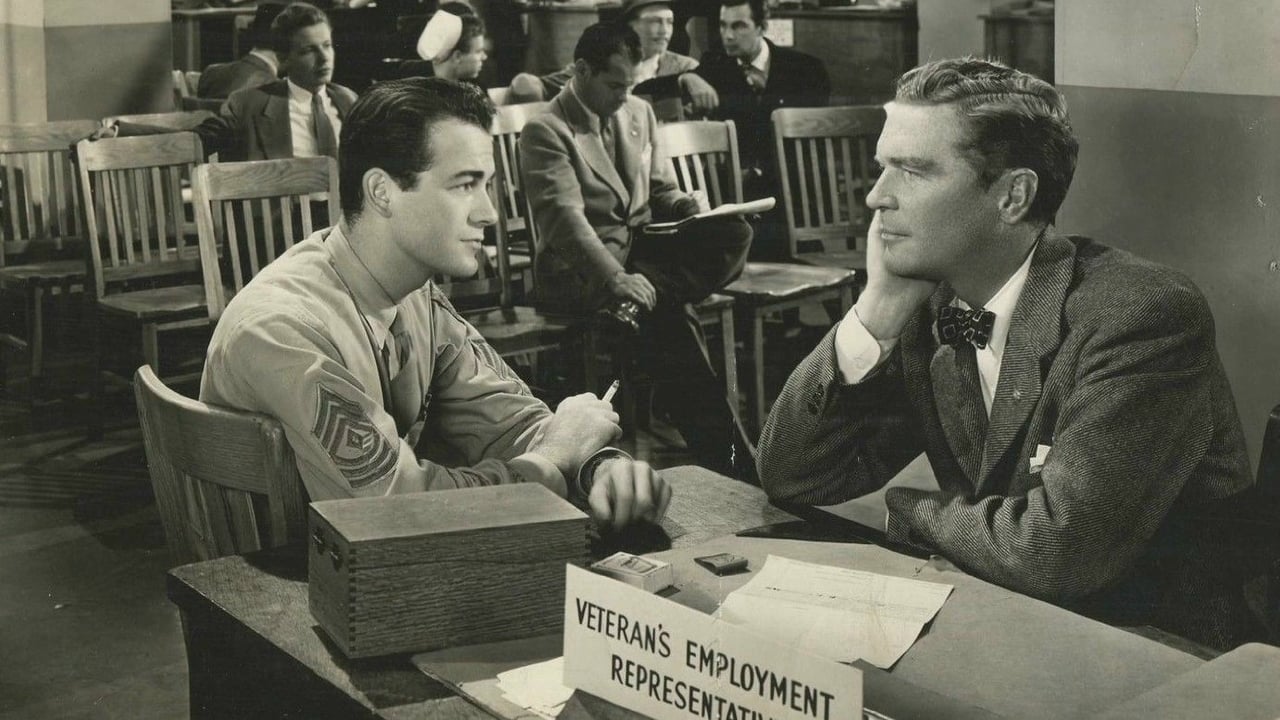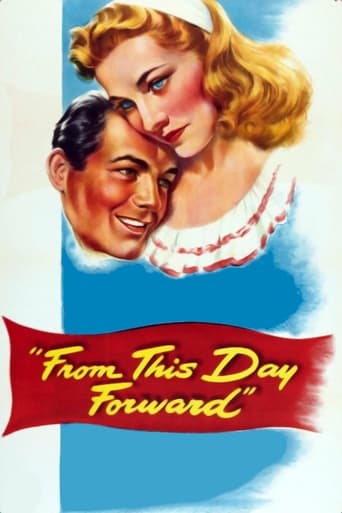


Although it hurt to see the lovely, graceful Rosemary DeCamp shoe-horned into the role of a Bronx housewife (with matching accent) that fit where it touched this is, overall, a pleasantly satisfying entry even if it can't decide whether it's a social documentary, a romantic drama, or something in between. The ever reliable Harry Morgan lends both gravitas and stability to the mis-matched but earnestly sincere leads Joan Fontaine and Mark Stevens. It's virtually unknown - I, a lifelong moviegoer, had never heard of it - but certainly deserves more outings and/or a DVD release, which I would probably buy if it came my way. Meanwhile all I can do is recommend it.
... View MoreIn this film, Joan Fontaine comes closest to being a true 'screen goddess', and she surpasses the magic even of her performances in REBECCA (1940) and LETTER TO AN UNKNOWN WOMAN (1948), which most people, including myself until now, have thought her best. The trouble is that this film appears to have been suppressed for political reasons for nearly seventy years. It does not seem ever to have been released on video or DVD in America or Britain. I came across it because I was seeking films featuring Mark Stevens, and this starring role opposite Fontaine was effectively his debut. I discovered that this title was available in France, in the series of RKO pictures inexpensively distributed there by Editions Montparnasse. So I ordered it from French Amazon. It is now available in that French edition from British and American Amazon, at higher prices. Just before the film begins, you select 'Version Originale', and you get it without French subtitles. The film is based upon a powerful novel by Thomas Bell (1903-1961) entitled 'All Brides Are Beautiful' (which is a sardonic line of dialogue delivered by Fontaine in the film). Five writers wrote and re-wrote the screenplay, including the well known Garson Kanin, Clifford Odets, and Charley Schnee. The result of all that work was superb. The film was magnificently and brilliantly directed by John Berry, whose film noir TENSION (1949, see my review), starring Audrey Totter in probably her finest role, is a classic. Berry had what cynics calls 'a social conscience', and he was blacklisted and could not go on working in America, so he moved to France, dying there in 1999 aged 82, having directed many French films. His popularity in France doubtless explains why the French have rescued this early masterpiece of his and put it into circulation for the first time. This film is so amazing that the final shot in the film alone is so breath-taking that it is truly one for cinema history. The film is that rare thing, an American example of what we now call Neo-Realism, and it even outdoes Robert Rossellini, who the year before had made ROME, OPEN CITY, and this year was making PAISAN, with Germany YEAR ZERO to follow two years later. This film is an ode to the power of innocent young love to triumph over all obstacles, and there are plenty of those! The film portrays the full depth of the squalor and horror of lower middle class life in New York City in the 1930s and 1940s. Fontaine's sister and her family are so poor that they survive only by sending their little son to ask the local butcher for a soup bone for the dog to chew. The butcher knows there is no dog, and she boils the bone to make soup, which is their only food. The horrors of social injustice, of sudden loss of jobs and resultant total penury, of persecution by the authorities and the courts of Stevens for 'offending against the League of Decency' by illustrating a book with paintings he has done of nude models (resulting in a criminal record which prevents his getting employment), the crushing bureaucracy in the search for a job, the brutality of daily life and the coarseness of friends and neighbours, are all shown in grim detail. This film portrays the hollow nature of the myth of the American Dream with such overwhelming power and passion, that even today it seems that it is considered so dangerously subversive that no one must be allowed to see it. The story commences in 1946 (the year the film was made), with Stevens returning to civilian life at last, having been a master sergeant in the Army. As we see his pathetic and heroic struggles to find employment again as a machine lathe operator in a factory, we view the history of his marriage to Fontaine in 1938 and the years before the War in flashbacks. We never see him in the Army, since this is a film exclusively about civilian life and of a soldier returning to it. Stevens is perfectly cast as the 'good man' married to the 'angel' Fontaine, both of them doomed to struggle against the most grinding poverty imaginable. Despite the constant despair of their situation, they keep the freshness of their love for one another shining amidst the gloom. It was undoubtedly the purpose of the film to contrast the goodness of the characters with the shallowness and callousness of so many other characters in the film, but above all to portray them in the sharpest possible contrast to their intolerable situation. Here we see the merciless and heartless American non-dream trying to crush the idyll of love of two pure souls, but despite everything that life can throw at then, they refuse to crack. Berry wishes these two simple people, fortified by love, to be seen as the true American heroes. His hatred of everyone and everything that tries to destroy them is so strong that he strips away all the myths of a land of plenty to show how a divine light can still shine deep within a dung heap, in defiance of all lies, brutality, and hypocrisy. This film was John Berry's testament, but watching it is a far from comfortable experience. It challenges all of our cozy assumptions and it makes us realize how lucky we are if we have even a few pennies to our name, or can afford the dizzying luxury of actually eating supper tonight. Perhaps every spoilt brat child in America today should be forced to stop playing video games for an hour and a half and made to watch this film, and get some realistic perspective on life. But the social challenge posed by this film is too great, hence its shocking suppression in the English-speaking world for three quarters of a century. We must not be allowed to see it!
... View MoreFrom This Day Forward is directed by John Berry and adapted to screenplay by Garson Kanin and Hugo Butler from the novel All Brides are Beautiful written by Thomas Bell. It stars Joan Fontaine, Mark Stevens, Rosemary DeCamp, Harry Morgan, Wally Brown, Arline Judge and Renny McEvoy. Music is by Leigh Harline and cinematography by George Barnes.Rom-Dram that finds Stevens and Fontaine as a young couple struggling with the perils and optimism of post-war life. Story unfolds in flashback as Stevens reminisces about how he met Fontaine and their subsequent courtship that was fraught with uncertainty about what the future had in store. The Depression bites hard and Stevens finds himself a kept man as Fontaine's wages has to cover for the both of them. It's a pretty simple fable, but one of romantic hope in times of hardship, Stevens and Fontaine are good together, if a little miscast considering the themes at work in the screenplay. Popular with audiences back in 1946, its escapism factor would have been a huge pull, it is however now something of an antiquated sitting, a laborious picture that sort of just exists as a time-capsule piece. Approach with caution. 5/10
... View More'From this day forward' is a rare enough film in Hollywood, part of the post-war cycle of coming-home movies, of GIs returning from the ironic certainties and status of war, and finding the stability of home fraught and precarious: jobs gone, identity questioned, loved ones changed. The masterpiece of this cycle is 'The Best Years of our lives', and 'Forward' may not be in that class, despite some critics' admiration for it. But it is a different kind of film from Wyler's - the latter shows the war as an irrecoverable breach, a disjunction between past and present, where the post-war world cannot simply return to that before it. Its heroes were men with secure identities before the war took them away. For Bill Cummings, the war was a break from a life of banality, mediocrity, poverty, unemployment, frustrated ambition, even brushes with the law. Though rigorously focused on the domestic, on men who have been, to put it crudely, feminised, dependent on a bread-winning wife, denied an arena in which to express their masculine status, and thus paving the way for the melodramas of Minnelli and Sirk, the film is not a melodrama in the sense of giddy emotional highs and miserable lows. 'Forward' is rare in Hollywood because it is content to focus on unremarkable ordinariness, the undifferentiated, relentless grind of life, from which brief epiphanies or happiness can be salvaged. These are lives gradually frayed by economic circumstance - there is no melodramatic adultery or contrived plot mechanisms like that; even the singular encounter with the obscenity laws, not exactly the fate of every John Doe, is made bathetic and normalised. The best and most characteristic sequence of the movie is when Bill gets a night-shift job, while his wife Susan still works by day - obviously they rarely meet, one asleep when the other comes home. No-one, of course, is to blame, but frustrations mount, tempers wear, and the couple gradually become less familiar to one another, have to watch what they say, becoming clumsy, resulting in that wonderful scene on the bridge where Bill gives Susan a ghastly anniversary present with money hocked from the tool kit on which he depends for his livelihood. Although the war is a crucial four year break tearing the couple apart, it is absent in narrative terms; present only in the scene where Hitler blares from a megaphone as Susan makes ill-timed plans for motherhood. For most people, the film suggests, in America at any rate, the war was a good thing, a rare burst of prosperity - now, for most people, the grind must begin again. Very few Hollywood films of the period suggested this, such fears were usually displaced onto the nightmares of film noir. And, bravely, the film never cops out - although seemingly upbeat, Bill and Susan have even more problems at the end than when they began - she is pregnant, he is still unemployed, the final gigantic crane shot of this tiny couple on a huge bridge, their uncertain future stretching before them, is very poignant.The film's two main formal devices - moving from the individual to the wider social context, showing that Bill's is only one story among millions, and also the external circumstances that decide his personal well-being; and moving between past and present, ironising the optimism of the title - create a narrative tapestry of unusual depth in Hollywood, a series of vignettes revealing a particular time and place in American history, as well as the people that lived it, the families and individuals, the entrepreneurs and workers, the artists and housewives. This is a thoroughly decent film in the best Hollywood liberal tradition, and I'm glad it was made. I can't say i enjoyed it very much. Maybe I like the 'contrivances' of melodrama too much. The acting is amiable - and Joan Fontaine is enchanting, freed from her mousy persona - but lightweight, especially compared to the giants in Wyler's film. I don't know, maybe decency just isn't always very exciting.
... View More